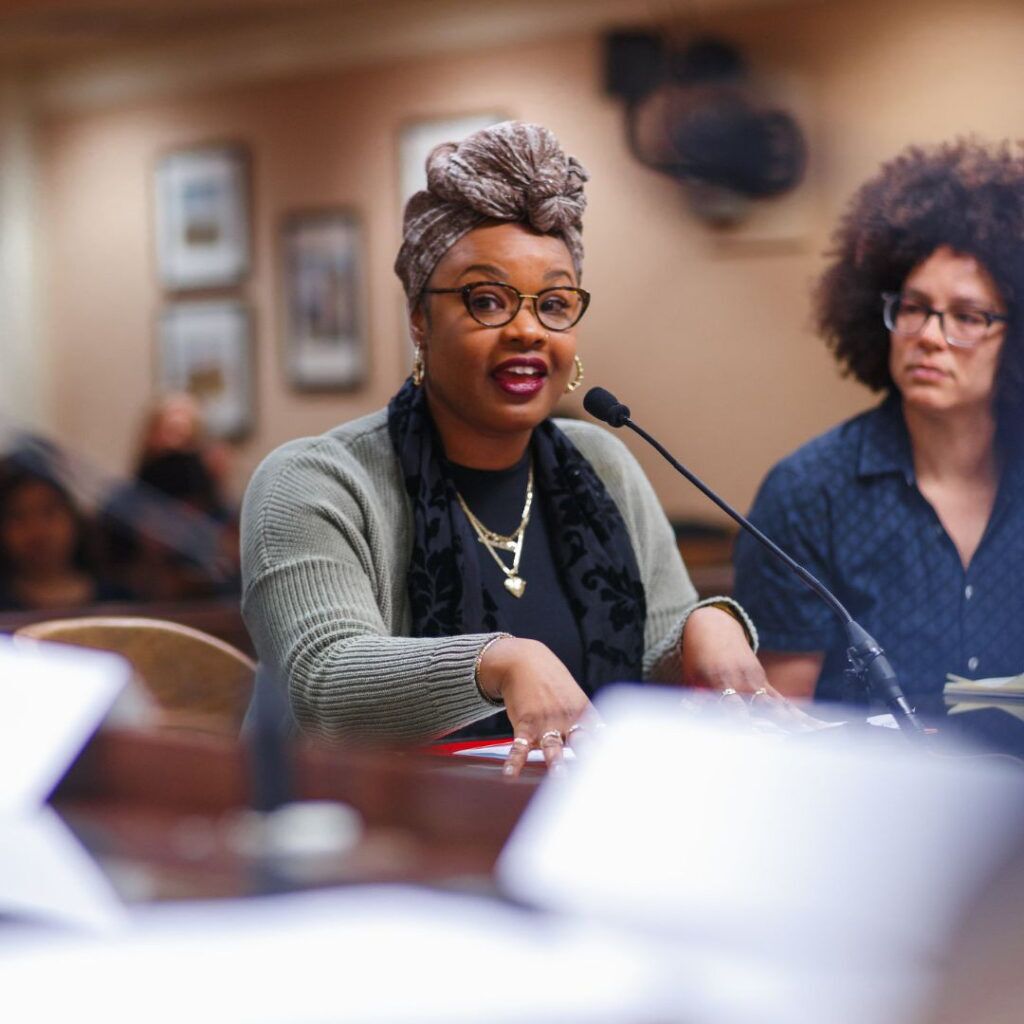
JD Vance’s Shameless Surrender To Putin
May 19, 2025
MAGA Is Now Threatening Walmart for Responding to Trump’s Tariffs
May 19, 2025Arlita Walker lives a fairly quiet life in southwest Memphis, Tennessee. The 60-year-old grandmother was employed with Federal Express for 15 years while she also raised her daughter. But when the toll of lifting heavy packages started to harm her health, Walker had to quit; she’s been grappling with health challenges since 2013.
Since then, Walker has managed to get her high blood pressure and diabetes under control, but she still battles with chronic obstructive pulmonary disease, which at times makes it difficult for her to breathe. She relies on a prescription medication called Trelegy Ellipta, an inhaler that she uses once a day. It carries a hefty price tag — $800 for a 30-day supply.
Medicaid has helped Walker to afford this life-saving treatment. It also has covered her blood thinner, copays, and transportation to her doctor’s appointments. But that access is in doubt for her and the 72 million people — one-fifth of the U.S. population — enrolled in the government health care program for low-income people and people with disabilities.
The U.S. House Energy and Commerce Committee, which manages Medicaid, has been directed to locate $880 billion in savings, and some Republican lawmakers want to include work requirements or make cuts to the program.
A key committee in the process, the House Budget Committee, advanced a bill late on Sunday that includes stricter work requirements, though it will likely undergo more changes before it passes the full House. The bill will almost certainly face challenges in the Senate.
House Speaker Mike Johnson has set a Memorial Day deadline for passing the bill through the chamber, though delays are expected.
Black Americans would bear the brunt of a Medicaid overhaul: About 20% of Medicaid enrollees are Black, while Black Americans make up just 14% of the U.S. population. Making big changes to the program also could devastate rural hospitals that depend on Medicaid reimbursements.
“What I’m worried about is that we will have to come out of our pockets [to pay]. And we all live on a fixed income, so we really don’t have that kind of money,” Walker told Capital B.
Walker’s monthly income stems from $1,170 in disability and $58 in food assistance. These payments must cover rent ($750), utilities ($200), and expenses for her 11-year-old granddaughter, who lives with her.
“And she can eat,” Walker said with a laugh.
If she has to finance her medical affairs without any help, she said, she’ll go bankrupt.
“It’s a lot of trying to figure out how to rob Peter to pay Paul, right? And make sure that everybody gets something,” she said. “You can’t win for losing.”
Medicaid’s uncertain future has left enrollees feeling helpless.
“I don’t like this [waiting],” Walker said. “If you want to do something, then give us a heads-up and do what you’re gonna do. Because we’re gonna have to find a way to make things happen.”
Democratic lawmakers have been condemning their Republican colleagues’ plans to target Medicaid.
“Medicaid has been a lifeline for millions of families in this country, but it has also helped us address critical disparities in health for Black communities,” U.S. Sen. Lisa Blunt Rochester of Delaware told Capital B in a statement, referring to how the program has helped to address the Black maternal health crisis. “Without access to this care, we risk exacerbating deep-rooted inequalities and putting lives at risk.”
Read on for a look at what might lie ahead for Medicaid — and how different lawmakers are responding. This story will be updated as legislative developments occur.
What changes are lawmakers considering?
Republican lawmakers are scrambling to figure out how to find billions of dollars in savings.
This month, House Energy and Commerce Chairman Brett Guthrie released a plan that would establish work requirements for “able-bodied adults without dependents.” People can meet these monthly requirements by “working at least 80 hours, completing at least 80 hours of community service, participating in a work program for at least 80 hours, enrolling in an educational program for at least 80 hours, or a combination of these activities for at least 80 hours.”
Some Republican lawmakers are calling for cutting certain payments permitted through the Affordable Care Act, or capping that spending on a per beneficiary basis. Under the ACA, states can expand Medicaid to adults with incomes up to 138% of the federal poverty level (which for a single person in 2025 is $21,597). The federal government covers 90% of these additional costs.
Forty states — including many red states — and Washington, D.C., have adopted Medicaid expansion, which has brought in some 20 million adults and has helped to shrink racial and ethnic disparities in coverage and access to care.
If Republican lawmakers were to eliminate the federal match rate, the U.S. government could save $626 billion over the course of a 10-year period, according to a recent KFF analysis.
What could these changes mean for coverage?
Advocates have warned that adding work requirements would result in people losing coverage.
“People are busy, and a monthly administrative burden is enormous,” Michael Linden, a former senior official with the Office of Management and Budget, told Capital B. “A lot of people end up not getting Medicaid because they miss a month of filing, or the forms are complicated, or they’re just trying to put food on the table.”
Eliminating the ACA expansion match rate would have a major impact on the health care landscape.
States would have to decide whether they want to absorb billions of dollars in costs to keep the Medicaid expansion coverage that millions of Americans use. Doing this would require that states increase taxes or scale back benefits.
Additionally, 12 states have “trigger laws” that would immediately terminate Medicaid expansion or require some sort of change in policy if the federal match rate ended or decreased. Enrollees in these states would be in jeopardy of losing coverage. Some states are attempting to abolish such legislation; others are seeking to enact it.
Trigger laws would likely have a disproportionate effect on Black communities. North Carolina, for instance, is a trigger law state and has some 3 million Medicaid enrollees, with more than 640,000 enrolled in the expansion program. Just 22% of the state’s population is Black, but Black residents make up 36.7% of expansion enrollment.
What impact could restructuring have on rural hospitals?
Straining Medicaid could put tremendous pressure on hospitals, which would still need to care for patients even though that care might not be paid for. This stress could result in the shuttering of hospitals — an outcome that would be especially devastating for residents in rural areas that already suffer from limited access to health services.
Communities in Mississippi, Georgia, and Tennessee are working to reopen the rural hospitals that Black residents need, but turning the lights back on is a massive challenge.
“True systemic change is a grassroots effort, but you will need people from the top pushing legislation that’s going to allow rural hospitals to survive or reopen,” Eva Rawls, a Black registered nurse who worked at a hospital in Tennessee, told Capital B in 2024.
North Carolina Gov. Josh Stein underlined the precarious situation facing rural hospitals in a March letter addressed to House and Senate leaders.
“The damage to North Carolina’s health care system, particularly rural hospitals and providers, would be devastating, not to mention to people who can no longer afford to access health care,” he wrote. “These are significant and immediate consequences.”
What are moderate Republican lawmakers saying?
Medicaid has helped people in both red states and blue states, and some Republican lawmakers are voicing opposition to legislation that threatens it.
“We won’t vote for something that takes away benefits from seniors, disabled and vulnerable people that we represent who rely on Medicaid,” Rep. Nicole Malliotakis of New York said in April.
Earlier that month, she and 11 other House Republicans — all of whom are in competitive districts where taking politically perilous actions could cost them their seats — wrote a letter to House leaders warning that they wouldn’t support a bill that erodes Medicaid.
“We cannot and will not support a final reconciliation bill that includes any reduction in Medicaid coverage for vulnerable populations,” the letter read.
Some Senate Republicans, including Sens. Lisa Murkowski of Alaska and Susan Collins of Maine, also are expected to challenge legislation that chips away at or eliminates Medicaid.
What has been the response from Democratic lawmakers?
Democratic lawmakers have been rallying around protecting Medicaid for months.
Most recently, on April 27, top Democratic lawmakers — including Sen. Cory Booker and House Minority Leader Hakeem Jeffries — held a sit-in on the Capitol steps. They highlighted what they said is the “moral urgency” of pushing back against legislation that would undermine health care access.
“We’re either going to choose the side of the American people, or we’re going to choose this cruel budget that Republicans are trying to jam down the throats of the American people,” Jeffries said.
Weeks before, Booker of New Jersey used a record-setting speech — it lasted 25 hours and 5 minutes, from March 31 to April 1 — to criticize the administration’s agenda, including its Medicaid plans.
“They are trying to gut Medicaid and Medicare, programs on which nearly a third of our country rely — all to pay for tax cuts to billionaires and corporations,” Booker said.
And on March 4, U.S. Rep. Al Green of Texas protested during President Donald Trump’s address to a joint session of Congress.
Toward the start of Trump’s speech, when the president claimed that the 2024 election — in which he received 49.8% of the popular vote and Kamala Harris received 48.3% — offered him “a mandate like has not been seen in many decades,” Green interrupted. He shouted that Trump has “no mandate” to dismantle Medicaid.
Great Job Brandon Tensley and Candace Y.A. Montague & the Team @ Capital B News Source link for sharing this story.








